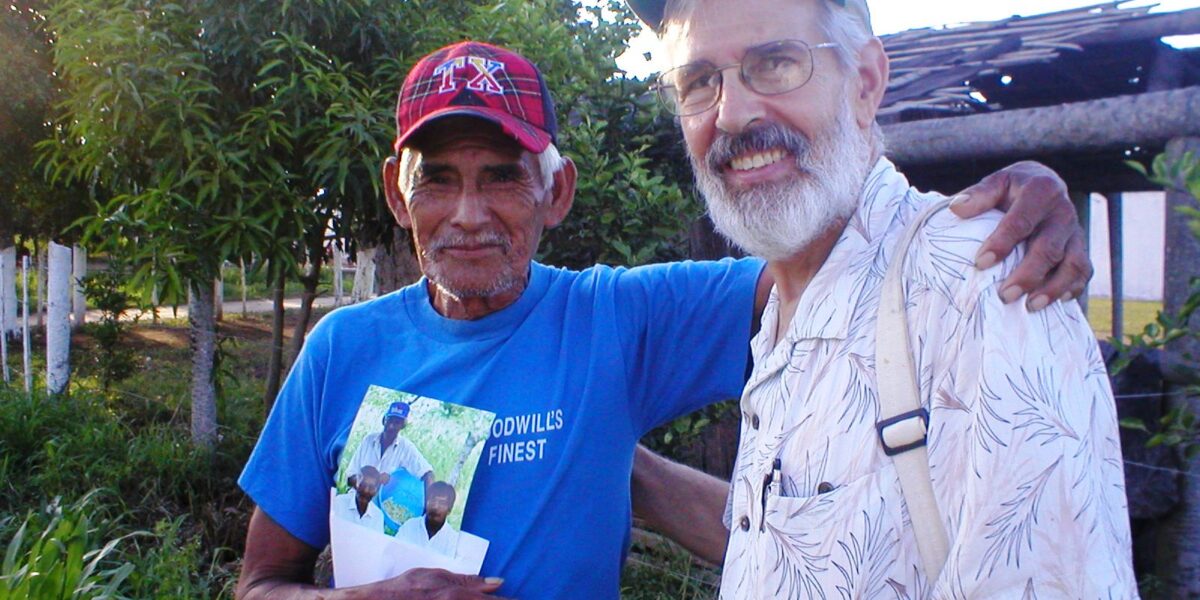Tito Bordón was second pastor of a Toba United church in La Primavera colony when we arrived in Argentina in 1997, but it was mostly an honorary role for him, since preaching wasn’t his gift, and he doesn’t read well. In recent years his role in worship is as a dancer, one of many. But he is perhaps the church’s most faithful obrero—worker. He always attends the services, and if there is work to be done—chopping firewood for cooking, thatching the roof of the church kitchen, setting up tables for a meal—Tito is in the middle of it.
I mention Tito, though there is nothing I know of that is spectacular about him, unless it is his steady, unassuming meekness. He prays out loud when he rises in the morning and retires at night. He rides his bike to town to cash his small pension check and buy poor cuts of beef to feed his family.
I know of nothing heroic about him, unless it is that, suffering the disgrace of being childless, he and his wife have taken in others’ unwanted children to raise as their own. I know of no courageous exploits except his venturing out into the Chaco wilderness to hunt alone or his participation last year in a four-month-long protest on the highway running through his colony, demanding the colony’s control of ancestral land. The police came, and two people were killed, but, thank God, not Tito.
I mention Tito because, like many of his fellow Toba believers, he is rooted in his culture, its language and its hunting-gathering customs. He is also grasped by an encounter with God. He delights both in the land, which he cultivates, and solidarity with his people, especially in the communal expressions of “alabanza,” the praise of God.
I mention Tito because he exists; he is “here,” one of the many Toba believers who live their largely anonymous lives in quiet fidelity—one of the meek who will inherit the earth. I mention Tito so that you will know there is such a man as he and that there is such a people as those to whom he belongs, who are poor in the eyes of the world but rich in faith. He belongs to a people who, as James says, stand to inherit the kingdom promised to those who love God (James 2:5).
For nearly 14 years, Gretchen, my wife, and I have accompanied Toba believers like Tito in northern Argentina. As preparation for this ministry, some 15 years ago, I acquired a book by Gustavo Gutierrez, We Drink from our own Wells: The Spiritual Journey of a People. But I failed to read it. I took it with me to Argentina, where it sat on my bookshelf until just before we left. When I finally read it, the book troubled me, though not because of its themes, which largely confirmed and nourished my Anabaptist faith.
Written nearly 30 years ago by a Peruvian priest, its point continues to be an important one, that the emerging spirituality among the poor of Latin America is life giving because they are “drinking from their own wells.” Furthermore, the author contends that this new spiritual dynamic holds out life, salvation even, to those of us who drink from other wells, other spiritual traditions.
The book troubled me because it made me reflect on our years of living and working among some of the poor of Latin America. Has indigenous spirituality indeed brought about liberation of the poor and conversion of the powerful? And have I had the sensitivity to perceive this spirituality, the vulnerability to enter into it, experience it and be converted—and saved—by it? Reading this book at the end of our missionary career has served to raise questions that anyone might face at the end of a career: What’s the significance of what I’ve done? How am I to characterize our years of ministry, its ups and downs, my own achievements and failures? What am I to say to others?
What I can do with integrity and passion is testify: tell about what we have heard and seen and touched in the course of our sojourn. A brief story by Eduardo Galeano, a Uruguayan writer, exhorts me to do just that.
He tells of Fernando Silva, director of a children’s hospital in Managua, Nicaragua. Working late one Christmas Eve, he was approached by a small boy he knew to be dying and who was completely alone in the hospital.
As the boy approached him, he reached out his hand to take Fernando’s: “Tell someone,” he whispered; “tell someone that I am here.”
I mention Tito so you know he is here.
###
Mennonite Mission Network, the mission agency of Mennonite Church USA, leads, mobilizes and equips the church to participate in holistic witness to Jesus Christ in a broken world. Media may contact Andrew Clouse at andrewc@mmnworld.net, 574-523-3024 or 866-866-2872, ext. 23024.







